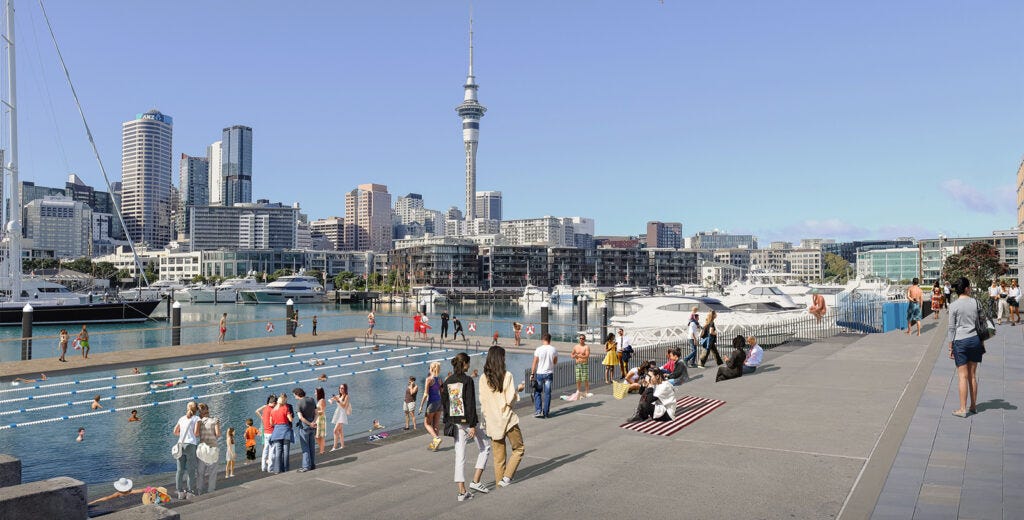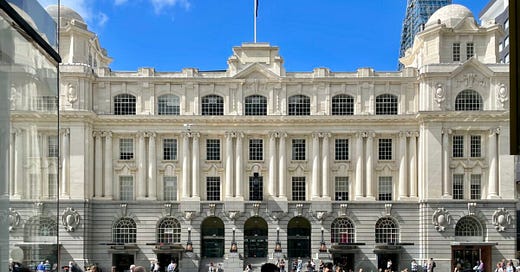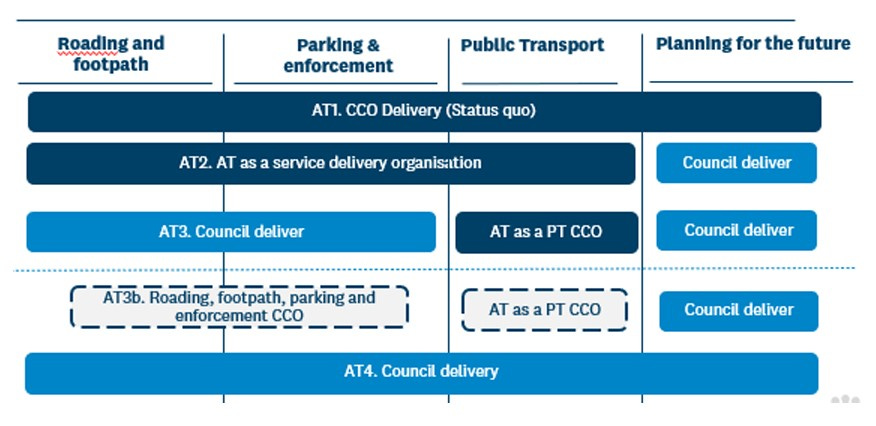Greater Auckland is brought to you by a largely volunteer crew and made possible by generous donations from our readers and fans. If you’d like to support our work, you can join our circle of supporters here, or support us on Substack!
Last week Mayor Wayne Brown proposed a major shakeup to various Council Controlled Organisations as part of his 'Mayoral Proposal' for the 2025/26 Annual Plan. This is the biggest proposed change to the CCO model since the establishment of Auckland Council, and would see significant functions performed by Eke Panuku, Tataki Auckland Unlimited and Auckland Transport brought back under direct Council control. Here's a summary of what's proposed:
Eke Panuku Development Auckland
Mayor Brown’s proposal includes bringing urban regeneration and property management back in-house under council control, to ensure better alignment and integration with other growth-related activities, which would result in the disestablishment of Eke Panuku. All policy, strategy and planning functions would also return to council.
“Auckland Council is already responsible for urban regeneration through planning and regulation of land use,” Mayor Brown said.
“Eke Panuku’s involvement in urban regeneration has led to duplication and confusion around the accountability of projects.
“My proposal will enable local boards to have greater decision-making power over local urban regeneration so there is a more community-focused approach to local placemaking,” Mayor Brown said.
Tātaki Auckland Unlimited
Mayor Brown is proposing to retain Tātaki Auckland Unlimited’s trust structure to manage regional facilities, Auckland Art Gallery, Auckland Zoo, theatres and stadiums.
Economic development, destination marketing and major events would be consolidated within council.
Auckland Council’s main lever for economic development is planning for land use and infrastructure to support future growth.
The proposed changes will integrate other economic development activities, like support for targeted industries and investment attraction, with the council’s broader role in growing the regional economy.
“The main focus of economic development must be on using our planning tools to lift regional productivity so that all Aucklanders can enjoy a higher standard of living.
“There is a fine line between public good and private benefit when it comes to targeted industry support for things like film and tourism.
“I believe these activities need greater democratic accountability and scrutiny to determine the role they play in Auckland’s growth,” Mayor Brown said.
The proposed changes to Tātaki Auckland Unlimited will not affect service levels, with ratepayer funding for economic development unchanged in the Long-term Plan.
Auckland Transport
Auckland Transport, unlike the other CCOs, is a statutory body. Any structural changes to AT will require legislation.
In August 2023, the Transport and Infrastructure Committee of the Governing Body gave Mayor Brown a mandate to advocate for legislative changes that will restore democratic control of Auckland’s transport system.
“I have made significant progress in my discussions with central government since then,” Mayor Brown said.
Last week, the Minister for Local Government and Transport, Hon. Simeon Brown, confirmed that the Cabinet has authorised him to work with the mayor on options for transport governance reform.
“The minister and I agree that Aucklanders should be empowered, through their elected mayor and councillors, to make key decisions about the region’s transport system. I will have more to say on that in due course,” Mayor Brown said.
In the interim, Mayor Brown is proposing to take immediate steps to begin the process of taking back control from AT. These measures include a proposal for Auckland Council to assume control of AT’s back-office functions.
“As funder and shareholder, Auckland Council has the right to put conditions on our funding. I have proposed that we get advice on how we can make operational funding of AT’s back-office functions conditional on Auckland Council providing those services,” Mayor Brown said.
These functions will include communications and marketing, legal and finance services. AT will also be mandated to participate in the council’s Group Shared Services programme for information technology, human resources and payroll.
“I have also proposed that Auckland Council take responsibility for all regulatory, policy and strategic planning functions for which AT does not have a statutory role. This includes rules around street trading, as well as the Harbourmaster function,” Mayor Brown said.
I'll get to Auckland Transport in a minute, but completely disestablishing Eke Panuku seems like a bad idea - especially coming on top of the government significantly reducing the role and influence of their redevelopment agency - Kainga Ora. Urban redevelopment is complicated, takes time, but is so immensely valuable to the future of this city. If Eke Panuku have sometimes underwhelmed us, it's because they haven't had the financial backing they really needed. But with the Council's core planners more interested in protecting 'character' at the cost of anything, and the Auckland Design Office long gutted, there's a massive risk disestablishing Eke Panuku will leave a massive vacuum nobody is able to fill.

Turning to Auckland Transport, the Mayoral Proposal and staff advice supporting its development articulate the case for change as being largely around an understandable dissatisfaction elected members have about the lack of control and democratic accountability they have over by far the largest area of expenditure - and often the area of council that's of greatest interest to the public.
Auckland Transport through its establishment, was given special protection under legislation as the sole provider of transport services, planning and delivery for Auckland.
It’s important to recognise that we are the only region in New Zealand that doesn’t democratically elect the people responsible for regional transport planning and strategy. Based on staff analysis, this also makes us an outlier internationally.
While councillors get to appoint the board, AT’s special legal status sets it apart from any other CCO. In reality, this makes it very difficult for us to effect change or determine the direction of transport planning for Auckland. As a result, over time, public trust and confidence has been eroded and the sense of democratic accountability has been lost.
In August 2023, the Transport & Infrastructure Committee gave me a mandate to advocate for legislative changes that will restore democratic control of Auckland’s transport system.
I have made significant progress in my discussions with central government since then. Earlier this year, the Minister for Auckland and Minister of Transport, Hon. Simeon Brown, publicly acknowledged the need for change, announcing that a work programme was underway to reform transport governance in Auckland.
We agree that Aucklanders should be empowered, through their elected mayor and councillors, to make key decisions about the region’s transport system. We also share concerns that Auckland Transport needs reform and that its decision-making has not adequately reflected Aucklanders’ views or responded effectively to their needs for moving efficiently around our city.
While it's usually concerning when the two Browns agree on something - and we certainly probably differ in terms of what we might criticise Auckland Transport's decision-making - the lack of control the Council has over key transport strategy, planning and policy matters has long been a concern of ours. Including right back to when Auckland Transport was first being established.
There are probably too many specific examples of how Auckland Transport has undermined the council to point to, but a few stick out over the years as being particularly egregious:
The way Auckland Transport did everything they could between around 2017 and 2022 to undermine development of a connected safe cycling network. Behind our satirical April Fool's Day post in 2021 was a deep anger that despite a massively supportive political environment and more available funding than ever, Auckland Transport somehow managed to make slower progress in rolling out a safe cycling network than they had in the years before.
The way Auckland Transport messed up the 2018 and 2021 Regional Land Transport Plans. First, in 2018 Auckland Transport deliberately undermined the council and the government to the point of Ministers and Mayors needing to directly step in. Then in 2021 they produced an RLTP that directly contradicted the council's emissions reduction targets so much that somehow we ended up with the farcical situation of the council and AT defending the RLTP in court while also developing an emissions reduction pathway to fix up the mess they'd made. Even earlier this year, when understandably the political direction was more tricky, AT still managed to have no logic behind their prioritisation process.
And speaking of fallout from the farcical 2021 RLTP, Auckland Transport then did their very best to undermine the one bit of actual visionary transport planning we've seen in recent times - the Transport Emissions Reduction Pathway.
Auckland Transport has also done some great things - most notably a major revamp of the bus network, getting City Rail Link over the line and ready for implementation, and successfully overseeing the introduction of electric trains. Some of these - especially the bus network changes - had lots of tricky local impacts that means they may not have happened if AT had just been a part of the Council. We have also seen - eventually - steady expansion of the bus lane network to help improve the public transport network's efficiency.
Given this, it was good to see that a fairly comprehensive assessment of different options for reforming AT were looked at (sprinkled through different parts of the staff advice). These seem to have been the main options looked at:
This covers the full spectrum from status quo right through to the disestablishment of Auckland Transport. Option AT2 is the one that forms part of the Mayor's proposal. This is what's suggested:
In my role as Mayor and in line with the direction provided by the Transport and Infrastructure Committee, I will continue to pursue legislative change through engagement with central government. I will keep you updated as discussions progress. I support, in principle, a full reset bringing all transport policy, strategy and planning functions back to Auckland Council. I propose that Auckland Council, as a funder, take responsibility for providing backoffice functions to AT. This should include communications and marketing, legal and finance services. I will seek advice from staff on how this can be implemented from 1 July 2025, with consideration given to budget decisions and funding conditions.
There are also other non-legislative changes we can and should get on with. As a first step, I propose we review existing delegations from Auckland Council to Auckland Transport, with a view to bringing these functions back in-house. These include rules around street trading, as well as the Harbourmaster function.
I would also like Auckland Council to take responsibility for all transport policy and strategic planning functions for which AT does not have a statutory role.
As discussed later in this proposal, Auckland Transport must fully participate in the Group Shared Services programme.
Of all the options on the table, this does seem to find the best balance. The status quo clearly hasn't worked, despite a lot of efforts to make 'soft changes' to it by the Council over the years. Fully disestablishing AT is also likely to be very problematic, bringing a huge number of what should be operational decisions into the political realm of the Council. Option AT3, where AT is narrowed down to focus on public transport delivery, actually seems like one of the most common structures around the world and could mean better 'street level' integration between transport and urban development. But it also breaks the multi-modal function of the organisation and splits PT operations away from PT capital projects, which is a nightmare elsewhere around the country. 3b just sounds stupid.
One of the odd things about the proposal is that while it's wrapped into the 2025/26 Annual Plan process, it doesn't seem like there's an intention for public consultation and engagement on any of the CCO changes. Council is guilty of over-consulting on things all the time, but this is a pretty major change to how local government operates in Auckland and it seems like quite a lot of value could be added through properly bringing this into the Annual Plan consultation process.





